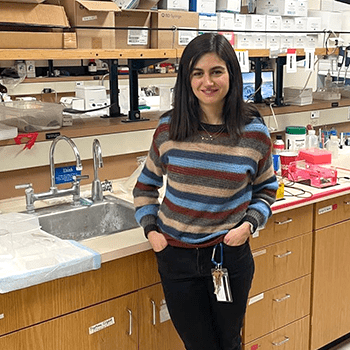
From the Basque region of Spain, Ines Erkizia-Santamaria comes to UC Santa Cruz with an appetite for neuropsychopharmacology research.
Home Institution: Universidad del País Vasco UPV/EHU (University of the Basque Country)
Field: Neuropsychopharmacology
UCSC Faculty Sponsor: Professor Yi Zuo
In our conversation, we learn about Ines’ research and interest in UCSC.
GE: Please share a brief overview of the field of research you are focused on.
Ines: My field of research is neuropsychopharmacology. We study drugs that affect the brain and we focus on the treatment of psychiatric illnesses, particularly depression and also schizophrenia. My PhD specifically focuses on new treatments for depression, and we are focusing on psychedelics which are currently very popular.
Psychedelics are everywhere because they seem to be able to improve symptoms of treatment-resistant depression, which doesn’t respond to traditional medications. So it’s a very exciting field at the moment.
GE: How did you become interested in the field of neuropsychopharmacology in the first place?
Ines: While working on my pharmacy degree, I had a subject on psychopharmacology. Here, I learned about drugs that affect the brain, consciousness, and other psychoactive compounds. I thought it was fascinating and I was drawn to the molecular basis of how drugs interact with receptors and neurons, and how these molecules can change what we see, what we hear, and what we think.
The professor in this subject encouraged us to read research first, to explore and see if we were interested in pursuing a career in research. I really enjoyed it. So, for my end-of-degree project, I went into the lab where they studied these types of subjects at my university and I did a project on schizophrenia. I started doing experimental research work in the lab with animals, administration of drugs, etc.
After this research, it was suggested that I pursue a PhD. We focused the subject on new waves of research in psychedelics and depression. And that’s how I eventually got into neuropsychopharmacology.
GE: So when you say psychedelics, what are we talking about exactly?
Ines: There are many psychedelic compounds and nowadays, clinical research for depression is focused on psilocybin, the active compound in magic mushrooms. There are other types of psychedelics that are also promising and potentially therapeutic, like ayahuasca, mescaline, LSD, or other substances which have similar effects. But I’m focusing on the study of psilocybin.
Let us not forget that all of these compounds are being tested in strictly controlled clinical environments, within approved and regulated clinical trials. They are powerful substances and are not free of undesired side effects. So, learning more about how they exert their effects (both therapeutic and potentially harming) will help clinicians improve their use and administer them in a safe way. By no means should they be used by the general public in an uncontrolled way.
GE: Very interesting. So, how did you learn about UCSC and why was UCSC a good fit for your research?
Ines: During the pandemic, when I began my PhD, I was reading a lot because I couldn’t really go into the lab and do experiments. I was trying to obtain knowledge from the literature in order to design my experiments and perform them once we got back to the lab.
I learned about Dr. Yi Zuo, who is the Principal Investigator of the lab that I’m currently in. Professor Zuo has a long career in researching neural circuits, neuron dynamics, learning, stress, and depression and how neurocircuitry changes in these states. She has also recently started working on psychedelics, so our interests were definitely aligned.
I began to dream about coming to UCSC and working with Dr. Zuo one day. When I was more advanced in the course of my PhD and began the search for a place to do my international rotation, I thought this would be an excellent opportunity.
I have found that in this lab and in this country, there is funding and opportunity for collaborative scientific research. Additionally, there are techniques used here that we currently don’t use in my lab, and that can lead to new discoveries.
GE: What does collaborative work look like for you and how might it influence your work or enhance your perspective?
Ines: These days, international collaborations are much easier to experience than they were years ago due to technological advancements. I can perform experiments in a lab in the U.S., share data with colleagues, discuss the data in real time, and publish papers with people from all over the world.
I’m learning a lot from my colleagues, leveraging the latest technology to conduct experiments, and learning about other subjects through cross-departmental collaboration. This includes information about other illnesses, drugs, and processes, which might end up being useful in my career in the future. I look forward to the experiments I’ll be doing here at UCSC, which will give rise to many collaborations and possibly further experiments.
GE: As you mentioned, you are just getting started at UCSC. Looking forward, what are your aspirations?
Ines: First, I will need to get into a routine and perform experiments. Then, in four months when I return to Spain, I will analyze the data that we collect here. After I finish my PhD, I plan to be a post-doctoral researcher somewhere.
GE: Where can we learn more about the work that you and the labs you are working with are doing?Ines: You can learn more about the work at UCSC in Dr. Yi Zuo’s lab on the Zuolab website. There is also the Neuropsychopharmacology Research Group website from the University of the Basque Country. And lastly, you can stay up to date with my work through my Twitter account.
